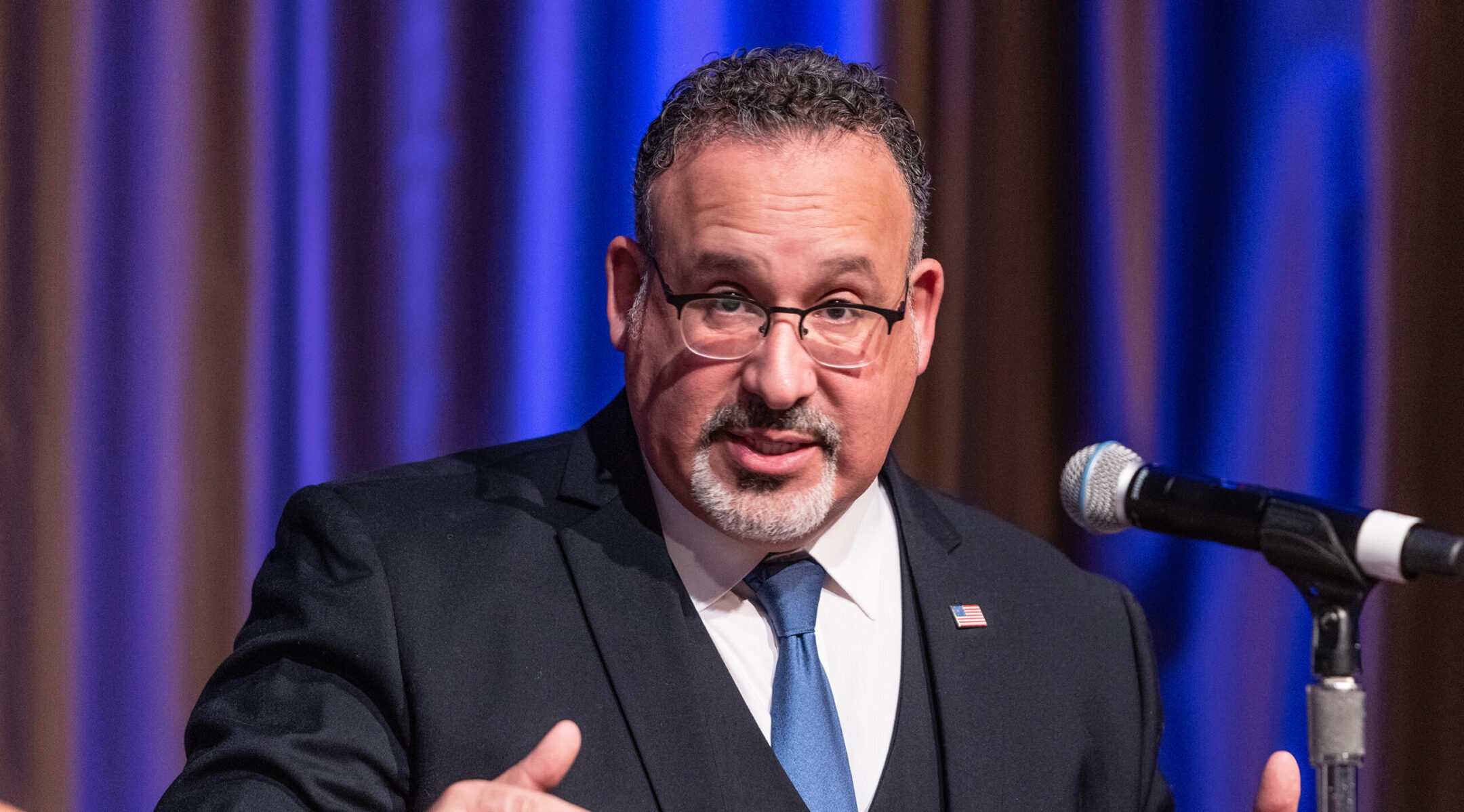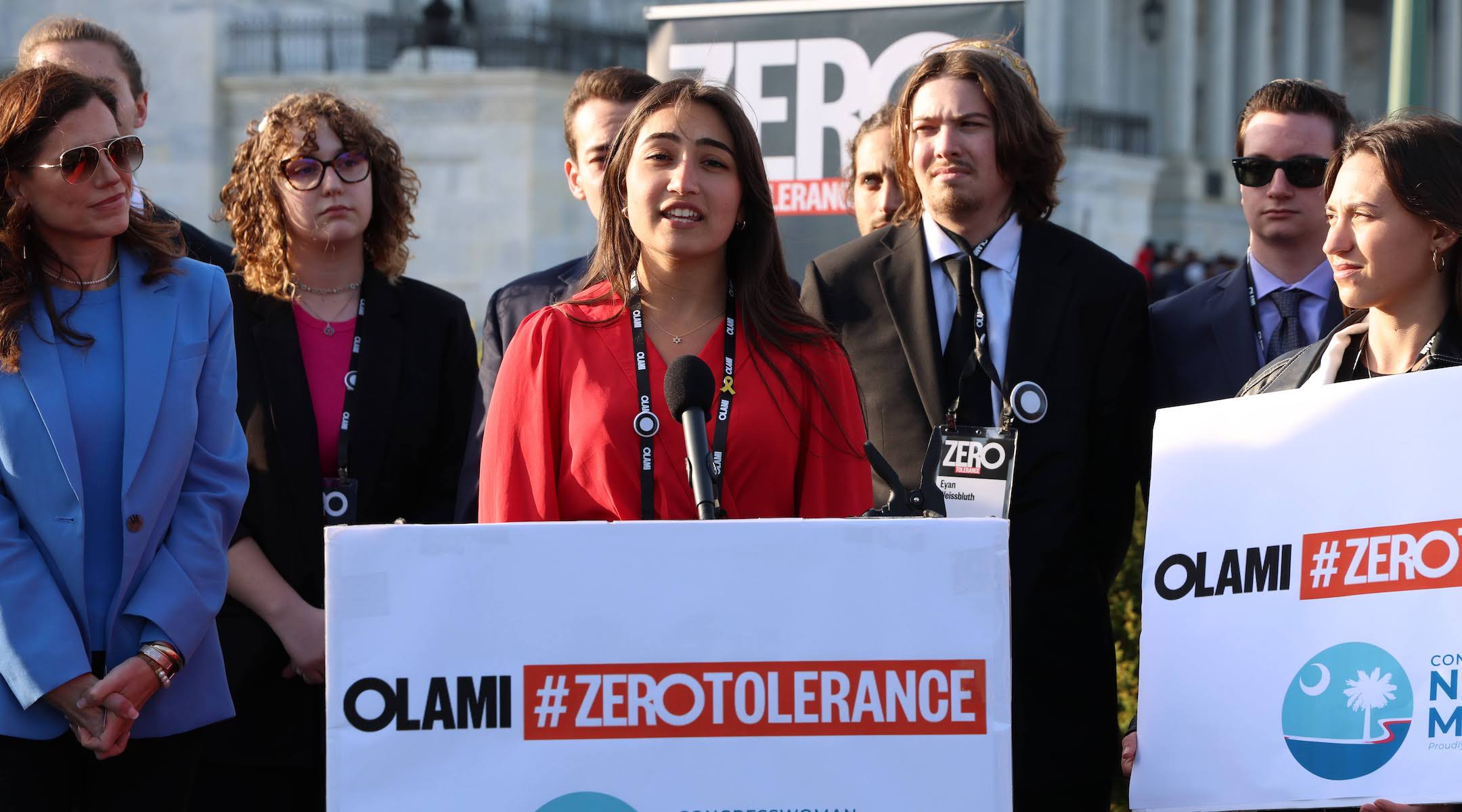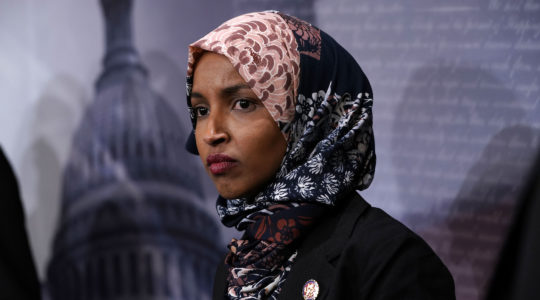(JTA) – Since Oct. 7, the federal office that handles investigations into campus civil rights has kept many details of its work confidential — including which cases focus on antisemitism.
But now the U.S. Department of Education has begun revealing more about the investigations it has launched since the beginning of the Israel-Hamas war. The new revelations follow a series of reports from the Jewish Telegraphic Agency uncovering the opaque mechanics of how the department enforces Title VI anti-discrimination law.
Meanwhile, the department’s Office of Civil Rights continues to open new investigations into allegations of campus antisemitism, including one this week at the University of Hawai’i.
These new documents include the original complaint letters that spearheaded the investigations, as well as the lists of documents OCR requests from schools in order to adjudicate the claims. They reveal that more of the department’s investigations relate to claims of antisemitism and Islamophobia than previously known. They also demonstrate how OCR investigates cases of alleged discrimination and harassment against Jewish students.
In addition, they reveal previously unknown details of several Israel-related investigations at high-profile schools. And they confirm trends first described by JTA’s reporting. For example, the documents show that many people who submit federal antisemitism complaints about universities did so without first contacting the schools themselves.
Some of the key findings revealed by the documents include:
- An investigation into Columbia University centers on claims of discrimination against pro-Palestinian activists, not antisemitism. Jews have alleged an antisemitic environment at the school since the Oct. 7 Hamas attack. But the investigation relates to a complaint from the other side of the debate, alleging that the university’s decision to suspend its chapters of Jewish Voice for Peace, an anti-Zionist group, and Students for Justice in Palestine was discriminatory.
- Several complainants who allege campus antisemitism, including those who triggered investigations at the Massachusetts Institute of Technology, Cornell University, Stanford University and the University of Virginia, noted in their letters that they did not report the allegations to the universities before filing their complaints. This runs counter to OCR guidelines, which state that complainants should seek relief from universities first and that OCR is charged with investigating how well universities responded.
- A complaint letter that triggered a previously announced investigation into harassment of pro-Palestinian students at Harvard University also includes extensive allegations of discriminatory remarks the president of Harvard Chabad made against Palestinian students. It also references the Chabad’s decision to twice host talks by billionaire Jewish Harvard alum, investor and campus reform activist Bill Ackman, who has advocated for revealing the names of Harvard students who signed letters blaming Israel for the Hamas attacks. The Muslim legal group that filed the complaint had not previously publicized its mentions of Harvard Chabad or Ackman.
- The department’s investigation into the New York City Department of Education, which runs the city’s public schools, concerns allegations that a teacher “teaches 4 year old [sic] to hate Jews and is grooming them to be terrorists.” That teacher, Siriana Abboud, is no longer employed with the district, according to media reports.
- A complainant who triggered an antisemitism investigation at Muhlenberg College, a private Pennsylvania school, wants the college to remove Maura Finkelstein, a Jewish anti-Zionist professor who has written articles praising Hamas. For evidence, the complaint form links to an online petition calling for Finkelstein’s removal that alleges she has harassed Jewish students online.
- Several other active investigations whose origins had been shrouded do in fact focus on antisemitism, including those at Ohio State University, the Cooper Union, the University of Washington-Seattle, the University of California-Los Angeles, the University of California-San Diego and City of Decatur Schools in Georgia.
A Department of Education representative told JTA it began posting the notification letters in February “because of the widespread interest in those letters, including numerous requests for them under FOIA.” The department added that it would continue to post letters for all new shared ancestry investigations for the foreseeable future, and that it was working to post all remaining notification letters “as expeditiously as possible.”
A note on the department’s website says that it is only releasing letters for investigations opened after October 2023. JTA has filed multiple FOIA requests for the information in recent months.

Miguel Cardona, secretary of the U.S. Department of Education, participates in a public event in New York City, April 12, 2023. (Lev Radin/Pacific Press/LightRocket via Getty Images)
The increased transparency comes as students’ complaints of antisemitism and Islamophobia on campuses surrounding the war continue to ramp up. As of Tuesday, OCR has opened 86 “shared ancestry” investigations since Oct. 7, some of which it has since closed. (The office has provided documentation related to 61 complaint letters to date, not all of which appear to have led to investigations.)
Some Jewish groups have placed Title VI at the center of their fights against campus antisemitism, and are beginning to push for changes to the system. Olami, an Orthodox outreach group for Jewish college students, launched a lobbying effort this week alongside multiple members of Congress to make one change in particular: to force universities to preemptively report any antisemitism complaints they receive to OCR, even before an investigation is opened.
“You call 911, and no one answers. That’s not an acceptable reality,” Rabbi David Markowitz, managing director of Olami, told JTA about the current system. Markowitz said that Jewish students he talks to often don’t know to whom at a university they are supposed to report their allegations, and many don’t bother reporting them at all.
Instead, Markowitz said, Olami is pushing for universities to share details of these complaints in order to promote “transparency and accountability.” They launched the new lobbying effort Tuesday in a press conference alongside Republican Rep. Nancy Mace, and Olami says they expect many more legislators to sign onto a letter to be sent to Education Secretary Miguel Cardona outlining the proposed changes.
“We want to make sure that we are demanding decisive steps from universities to combat antisemitism and Jewish hate, rather than to pay lip service to it,” the South Carolina lawmaker said in a press conference with Olami Tuesday, also referencing the historic Charleston synagogue located in her district. A spokesperson for the education department said they looked forward to reviewing Olami and Mace’s request.
Meanwhile, OCR continues to open shared ancestry Title VI investigations. This week it opened four: at the South Orange-Maplewood School District in New Jersey; at a K-12 district in the Sacramento suburb of Roseville, California; at the flagship campus of the University of Hawai’i, and at the Western University of Health Sciences, a private medical school in Pomona, California.
Requests for comment to two of those four schools were not returned as of press time. A spokesperson for the University of Hawai’i told JTA the complaint was “in regards to allegations of antisemitism by faculty members stating support for Palestinian causes.”
The spokesperson added: “Since the start of the Israeli/Hamas war, a number of messages from leadership have been sent to the 10 campus system affirming UH commitment of non-discrimination and asking everyone to report any incidents of harassment and discrimination.” The president of the university had previously issued a statement of neutrality on the Israel-Hamas war, saying, “I am not a professional politician or an international political influencer.”
A spokesperson for the Roseville City School District did not confirm what the investigation was about but told JTA in a statement, “At this time, we are only able to share the general subject is a student suspension and subsequent complaint.” The statement also reiterated the district’s anti-discrimination policy.






